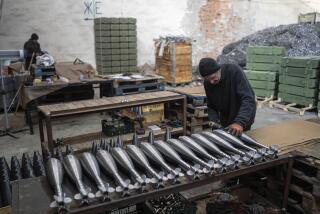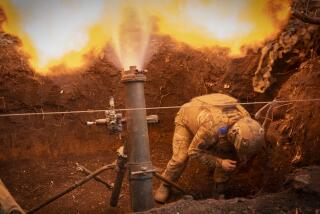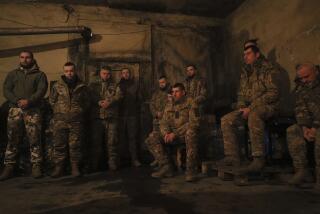COLUMN ONE : Putting Ax to Soviet Military : The defense industrial complex, resistant to reform, was a force behind the coup. Now it faces the prospect of a massive overhaul.
- Share via
MOSCOW — When Oleg Baklanov stepped out from behind the scenes to join the rightist junta that tried to seize power last month, he confirmed suspicions that the defense industry, a vast empire ruled by the grayest of bureaucrats, had long been the real force running the Soviet government.
Baklanov, a regular-featured, middle-aged man like so many of his anonymous cohorts, oversaw defense production from dual posts in the government and the Communist Party. Whenever he spoke in public, he praised glasnost, perestroika and democracy.
But the industry he represents--which accounts for a whopping 30% of total Soviet production, according to Western experts--was thrown into such agony by the cutbacks and turmoil of Kremlin reforms that it became arguably the most reactionary faction in the Soviet Union.
And Baklanov became the motor behind the putsch, well-informed politicians here believe. He is now charged with high treason.
“If you figure, using Marxist thinking, that economics is the basis of everything, then Baklanov was the basis of the coup,” said Vladimir Prokhratilov, a journalist and Russian government adviser who once worked in the space industry. “What happened was a putsch by the military-industrial complex.”
Baklanov may be gone, but the system that spawned him lives on, largely impervious to the perestroika of Soviet President Mikhail S. Gorbachev. The defense industry is so huge, pervasive and corrupt, experts argue, that it resists step-by-step reform. Now, the Soviet military-industrial complex may face something more dramatic.
Russian President Boris N. Yeltsin is proposing the massive privatization of defense plants and the cutoff of all government subsidies to the industry within two years. Such a task would be both massive and risky.
But it must be done, experts say. The Soviet defense industry accounts for a huge share of the economy, enjoying first call on raw materials. And it has locked away the majority of the country’s best minds and engineering talents in “post office boxes”--the Soviet expression for secret installations.
The system “must be dismantled and rebuilt as a rational productive system,” said John G. Hines, a senior Soviet military analyst at the RAND Corp. in Santa Monica. “The only way to fix it is to break it completely.”
“It is a Gordian knot around the Soviet future,” a U.S. Defense Department official said. “Until broken, the Soviet Union cannot privatize the economy and adopt free-enterprise methods. To ask (defense producers) to make baby carriages is a perversion of the market system. Instead, their back has to be broken and they have to be disbanded.”
The military-industrial complex so dominated conservative circles in Soviet politics that, as the newspaper Komsomolskaya Pravda pointed out, six of the eight members of the reactionary junta could be considered its handmaidens, from the defense minister to the chairman of an association of state-owned plants.
The coup may have represented the defense industry’s baldest political adventure, but it was hardly the first. The military-industrial complex grew with the Soviet military machine during the Cold War and actively resisted all efforts to trim it back.
Last fall, for example, Gorbachev publicly supported a radical 500-day economic reform plan, whose forced march toward a market economy would have spelled an end to the favored position of the defense industry.
Then, suddenly and without explanation, he withdrew his support. Georgy Arbatov, director of the prestigious USA Institute and a leading proponent of defense cuts, thinks he knows why.
Military-industrial leaders “just persuaded and pressured Gorbachev,” Arbatov said. “I think he rejected the 500-day plan under this pressure.”
Komsomolskaya Pravda contended that Baklanov had long been the “real commander-in-chief of the economy.”
“He held the real power, and not Prime Minister (Valentin) Pavlov, who now looks like a rascally teen-ager who got in with bad company,” it said. “Now Pavlov’s financial policy no longer seems absurd--he was saving the military-industrial complex at the expense of the people.”
And the industry itself, American analysts believe, dominated the uniformed military in Soviet defense planning.
Military hardware manufacturers dictated to the military what equipment they would receive, how much of it they would get and when it would be delivered--not the other way around, as in the United States.
About 75% of the Defense Council, which formulated military policy and reported to the Soviet President, came from industry, Hines said. When Gorbachev sought to convert defense plants to civilian production, he turned to the very men whose prime interest was to preserve the defense industry.
With great fanfare in late 1988, Gorbachev promised the modern equivalent of swords-into-plowshares--missiles into baby carriages. Indeed, the Defense Ministry proceeded to cut its military procurement budget by 29% over the next three years, according to the Cabinet’s Military-Industrial Commission, which oversees conversion.
But Western experts charge that for the most part, conversion of defense production capacity to civilian output simply has not happened. What’s more, they say, the military-industrial complex has extended its grip to the civilian sector.
“The fact is, it’s been growing,” said Richard Ericson, a specialist on the Soviet economy at Columbia University’s Harriman Institute. He noted that two civilian ministries, which produce medical equipment and machinery for the food industry, had recently been put under military control in hopes of increasing their efficiency.
Along with high-level resistance, cold economic realities have also done much to slow reform of the military industry.
If the scaling back of defense production is done wrong, said Vadim Sintsov, director of foreign relations for the giant Defense Production Ministry, it could ruin whole cities in the Russian heartland that depend on a single military plant. The entire output of many mines, steel mills and state farms is also funneled directly into the complex.
And radical change in such a gigantic system threatens massive unemployment among the estimated 15 million workers of the Soviet military and its supporting industries.
“Conversion is not some blessed state of the soul and body,” Sintsov said. “It is an extraordinarily difficult, tough, sweaty, bloody task--an economic task, a human task, a social task, a task of professional retraining.”
According to current Soviet government estimates, at least 40 billion rubles--$22 billion at the commercial exchange rate--are needed to retool defense factories. Billions of dollars more are needed for the research and development to produce new consumer products. And still billions more must be spent on retraining programs and unemployment benefits as employees shift from one type of work to another.
If the defense Establishment moves too quickly or chaotically in its cutbacks, it runs the risk of ruining the cream of the Soviet economy, one of the few areas in which Soviet producers truly competed with the West.
“Our cars and vacuum cleaners may not be known in the world,” Sintsov said, “but everyone knows a Kalashnikov (rifle) can lie in the mud for two weeks and still shoot afterward. We guarantee it.”
Yuri Andreyev, an economist and secretary of a public committee to promote conversion, said he could understand the predicament of defense manufacturers.
“Sometimes,” Andreyev said, “they come to us and say, ‘Look, boys, what should we do? The shop is filled up with land mines, for example, and we don’t know what to do with them. The Defense Ministry doesn’t want them anymore. They don’t have money.’ And we tell them, ‘You have to start producing something else, even pens, pencils, whatever, it will still be better than mines.’ ”
Even reform-oriented factory directors face the daunting task of making changes in the midst of a stormy economic revolution.
The central planning system that always supported them so well, giving them the best materials, plump budgets and excellent benefits for workers, is withering. And the old sources of guaranteed raw materials are no longer reliable.
With the putsch’s failure, reform of the defense industry is expected to proceed much more rapidly.
At the height of the coup attempt, when Yeltsin was issuing emergency decrees left and right, he asserted Russia’s jurisdiction over all industry on its territory, laying the groundwork for his announced plan to privatize much of the defense complex.
The plan, according to Komsomolskaya Pravda, consists of two phases:
* Many defense factories are to be sold immediately to private or corporate owners.
* After 18 months or so, the government will cut off its subsidies to the defense industry, and the owners can decide whether they want to produce civilian goods or compete for military orders under Western-style bidding.
The first modest attempts at market-style reform have already begun, journalist and Russian government adviser Prokhratilov said, as defense plants increasingly participate in commodities exchanges and middle managers get used to a new style of doing business, without doing everything through their ministries.
“If it weren’t for the opposition at the top, the transition would have been pretty smooth,” he said.
“Among the military,” Arbatov said, “there are rational people who understand that without a healthy economy there won’t be defense and who understand that we can’t support such an army and military complex anymore. These healthy forces in the military-industrial complex will support the transformation.”
Even with the backing of progressives and the best of wills, Yeltsin and his team of reformers face a mass of obstacles to make good their promises of reform.
Opposition is reportedly already mounting again from conservative factory directors, this time in the form of demands aggressively presented to Arkady Volsky, the Yeltsin appointee currently overseeing heavy industry, for more government money and resources.
More daunting yet to defense enterprises is the prospect of wading into the unfamiliar waters of competition, realistic pricing and market analysis--arts that have never been developed here.
“It’s far too soon to know what will happen,” a Soviet specialist on the staff of the House Armed Services Committee said in Washington. “Yeltsin himself doesn’t appreciate the magnitude of what he’s setting out to do. It’s one thing to say you’re going to privatize. It’s another thing to do it.”
Goldberg reported from Moscow and Broder reported from Washington.
More to Read
Sign up for Essential California
The most important California stories and recommendations in your inbox every morning.
You may occasionally receive promotional content from the Los Angeles Times.










